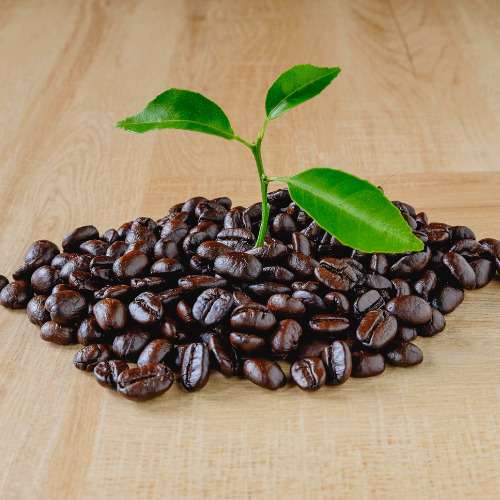Are you debating whether is it worth it to buy organic coffee beans while browsing the coffee aisle? You’re not alone—many want to know if the benefits justify the cost.
Many coffee lovers like you are curious about whether making the switch to organic beans truly makes a difference. Is it just a marketing gimmick, or are there real benefits for your health and the environment? We’ll dive into what “organic” really means for your coffee and explore whether the perks justify the price.
Get ready to uncover the truth about your favorite morning brew—you might be surprised by what you find!
What Makes Coffee Beans Organic
Organic coffee beans have gained popularity among health-conscious consumers. Many wonder what makes these beans special compared to regular ones. Organic coffee is grown without synthetic fertilizers or pesticides. This ensures a natural and eco-friendly process. Let’s delve into the factors that define organic coffee.
Certification Standards
Organic coffee must meet strict certification standards. This guarantees the product’s authenticity. Certifying bodies inspect farms regularly. They ensure compliance with organic farming regulations. Organic coffee must be free from chemical residues. This protects consumers from harmful substances. Farmers must use approved organic methods. This includes natural pest control and soil enrichment.
Growing Practices
Organic coffee beans are cultivated using sustainable methods. Farmers focus on soil health and biodiversity. They avoid synthetic chemicals, which can harm the environment. Compost and natural fertilizers enrich the soil. This improves bean quality and taste. Shade-grown techniques are often employed. These practices protect wildlife habitats. They also help preserve local ecosystems. Organic farming encourages responsible land management.
Health Benefits Of Organic Coffee
Organic coffee beans have become popular among health-conscious consumers. Many seek these beans for their potential health benefits. This choice isn’t just about taste. It’s about what’s inside the cup.
Regular coffee can contain chemicals and pesticides. Organic coffee offers a cleaner, healthier option. It provides benefits beyond the typical morning boost.
Nutritional Advantages
Organic coffee retains more nutrients compared to conventional beans. The soil in which it’s grown is richer. No synthetic fertilizers are used. This results in higher levels of antioxidants in the beans.
Antioxidants help fight free radicals in the body. They support the immune system and reduce inflammation. Drinking organic coffee can contribute to better overall health.
Reduced Chemical Exposure
Organic coffee reduces your exposure to harmful chemicals. Conventional coffee often uses synthetic pesticides. These can linger on the beans and enter your drink.
Choosing organic means fewer toxins in your cup. This can lead to better health and peace of mind. Organic farming practices focus on sustainability and safety.
These methods protect both the environment and the consumer. Organic coffee is a step towards a healthier lifestyle.
Environmental Impact
Buying organic coffee beans can reduce environmental harm. These beans grow without harmful pesticides, preserving soil and water. Choosing organic supports sustainable farming practices that protect ecosystems.
When you brew your morning cup of coffee, have you ever considered its environmental impact? Choosing organic coffee beans can make a significant difference. Organic coffee farming isn’t just about avoiding chemicals; it’s about fostering a healthier planet. Let’s dive into how organic coffee impacts the environment and why you might want to make the switch.
Sustainable Farming Techniques
Organic coffee farming utilizes sustainable practices that protect the land. These techniques involve crop rotation and composting, which naturally enrich the soil. By avoiding synthetic fertilizers and pesticides, organic farmers help maintain soil health and reduce pollution. I remember visiting a small organic coffee farm in Costa Rica. The farmer showed me how they used natural compost to nourish their crops. This not only improved the yield but also preserved the local ecosystem. Have you ever thought about how your coffee choice affects the land it grows on?
Biodiversity Conservation
Organic coffee farms often support greater biodiversity compared to conventional farms. Shade-grown coffee, a common practice in organic farming, provides habitat for various bird species and other wildlife. This contrasts with sun-grown coffee, which can lead to deforestation and habitat loss. On my trip, I noticed the incredible variety of birds chirping in the coffee trees. The farmer explained that the organic methods allowed these creatures to thrive. Isn’t it fascinating how a simple choice like buying organic can contribute to preserving wildlife habitats? When you choose organic coffee, you support practices that promote environmental health. It’s not just about a better-tasting cup; it’s about making a positive impact on the world around you. So, the next time you shop for coffee, consider how your decision affects the planet.
Economic Considerations
When considering whether to buy organic coffee beans, economic factors play a crucial role. Many coffee enthusiasts wonder if the extra cost of organic beans is justified. Examining the economic implications can provide clarity and help make an informed choice.
Cost Comparison
Organic coffee beans generally cost more than conventional ones. This is due to the farming practices involved. Organic farming avoids synthetic pesticides and fertilizers, which can be cheaper. Organic certification also adds to the cost. Farmers must meet strict standards, which involves fees and inspections. These factors contribute to higher prices for consumers.
Despite the higher cost, many buyers find value in organic beans. They often offer a richer, more authentic taste. For some, the flavor alone justifies the price difference. Also, knowing that their purchase supports sustainable practices can be rewarding.
Impact On Farmers
Buying organic coffee beans can positively impact farmers. Organic farming often ensures fairer wages for workers. It encourages sustainable farming methods, which protect the environment. Farmers benefit from healthier soil and less exposure to harmful chemicals.
Organic certification can provide farmers with better market access. This can lead to improved economic stability. Supporting organic coffee means supporting farmers’ livelihoods and their communities. It empowers them to continue sustainable practices.
Choosing organic coffee beans can be more than a personal preference. It’s an economic decision that can affect farmers and the environment positively.
Taste And Quality
Organic coffee beans often promise a richer, more authentic taste. Many coffee lovers seek out these beans for their unique flavor profiles. The quality of organic coffee is carefully monitored, ensuring a high standard. This level of detail can enhance the overall coffee experience.
Understanding the taste and quality of organic beans can inform your purchasing decision. Dive into the elements of flavor and quality control to discover their benefits.
Flavor Profile
Organic coffee beans offer diverse and complex flavors. The absence of synthetic chemicals allows the bean’s natural taste to shine. Expect notes of fruit, chocolate, or even floral undertones. Each sip can provide a unique experience.
Organic coffee is often grown in richer soil. This contributes to a more vibrant and robust flavor. The focus is on cultivating beans that truly reflect their environment.
Quality Control
Quality control is vital for organic coffee beans. Farmers follow strict guidelines to maintain bean integrity. This ensures that each bean meets high standards. Organic certification involves regular inspections and adherence to specific practices.
Monitoring the growth and harvesting processes guarantees a consistent product. The result is coffee that is both pure and flavorful. Choosing organic beans means selecting a product with careful oversight.

Credit: thebeancoffeecompany.com
Consumer Preferences
When it comes to choosing the perfect cup of coffee, consumer preferences are as varied as the beans themselves. As more people become conscious of what they consume, organic coffee beans have sparked curiosity and debate. Are these beans worth the investment, or are they just another trend? Let’s dive into the factors influencing consumer choices.
Trends In Coffee Consumption
Over the past decade, there’s been a noticeable shift towards organic and specialty coffee. Consumers are increasingly seeking unique flavors and sustainable options. Organic coffee, free from synthetic pesticides and fertilizers, is capturing the interest of those eager to enjoy their morning brew without compromising on health.
The popularity of organic coffee can be seen in the rising sales figures. Coffee shops and retailers are expanding their organic offerings to meet this growing demand. This trend indicates a broader move towards transparency and authenticity in what we consume daily.
Ethical And Social Influences
Ethical considerations are playing a significant role in shaping coffee preferences. Many consumers are now prioritizing beans that support fair trade practices and ensure fair wages for farmers. This ethical angle adds a deeper level of satisfaction to each cup consumed.
Social media and documentaries have amplified awareness about the origins of coffee. Personal stories from farmers and communities can influence your buying decisions by highlighting the impact of your purchase. Have you considered how your choice of coffee could support sustainable farming practices?
Reflecting on these factors, it’s clear that choosing organic coffee beans is more than just a taste preference. It’s a decision that aligns with values around health, ethics, and sustainability. Are you ready to make your coffee habit more meaningful?
Making An Informed Choice
Choosing to buy organic coffee beans can be more than just a preference; it’s a conscious decision that impacts various aspects of life. However, making an informed choice requires more than just knowing if the beans are organic. You need to consider your priorities and understand the balance between costs and benefits. Let’s dive into how you can make a thoughtful decision.
Evaluating Personal Priorities
Think about what matters most to you. Is it the health benefits, environmental impact, or simply the taste? Each factor can influence your choice significantly.
Health enthusiasts often prefer organic beans due to fewer chemical residues. If sustainability is crucial for you, organic farming practices typically support better environmental health.
Consider past experiences. Have you noticed a difference in taste between organic and conventional coffee? Your personal encounters can guide your priorities.
Balancing Costs And Benefits
Organic coffee often comes with a higher price tag, but what are you getting in return? Weigh the benefits against the costs.
Calculate your budget. If you’re a daily coffee drinker, buying organic may stretch your finances. Is the potential health benefit worth the extra expense?
Consider alternatives. Are there local farmers’ markets where you can find organic coffee at a better price? Sometimes, creative solutions offer the best balance.
Ask yourself this: Does spending more on organic coffee align with your overall lifestyle and values? Your answer will help steer your decision.
Ultimately, making an informed choice about organic coffee beans involves understanding your priorities and being mindful of the costs. Evaluate what’s most important to you and how it fits into your daily life. Only then can you decide if organic coffee beans are worth the investment.

Credit: www.wbroast.co.uk

Credit: www.deathwishcoffee.com
Frequently Asked Questions
What Makes Organic Coffee Beans Different?
Organic coffee beans are grown without synthetic pesticides or fertilizers. They adhere to strict farming standards. This results in a cleaner, more natural taste. Supporting organic farming also helps protect the environment. It’s a choice that can benefit both health and planet.
Are Organic Coffee Beans Healthier?
Organic coffee beans are free from harmful chemicals. This reduces the risk of ingesting pesticides. They often contain higher levels of antioxidants. These compounds can boost health benefits. Choosing organic may contribute to a healthier lifestyle.
Do Organic Coffee Beans Taste Better?
Many coffee enthusiasts find organic beans have a richer flavor. The absence of chemicals allows natural flavors to shine. Organic farming methods can enhance bean quality. Taste can be subjective, but many prefer the cleaner taste of organic.
Is Buying Organic Coffee Beans More Expensive?
Organic coffee beans generally cost more than conventional ones. The higher price reflects stricter farming practices. These methods ensure quality and sustainability. While more expensive, many find the benefits worth the price. It’s an investment in health and environment.
Conclusion
Choosing organic coffee beans offers both health and environmental benefits. They contain fewer chemicals and support sustainable farming practices. Taste differences may vary, but many find organic beans richer. Consider your budget and personal values when deciding. Organic beans might cost more, but the benefits can be worth it.
Support for organic farming promotes a healthier planet. Weigh the pros and cons to make the best choice for you. Enjoy your coffee journey with a conscious mind. Your cup can make a positive impact.







